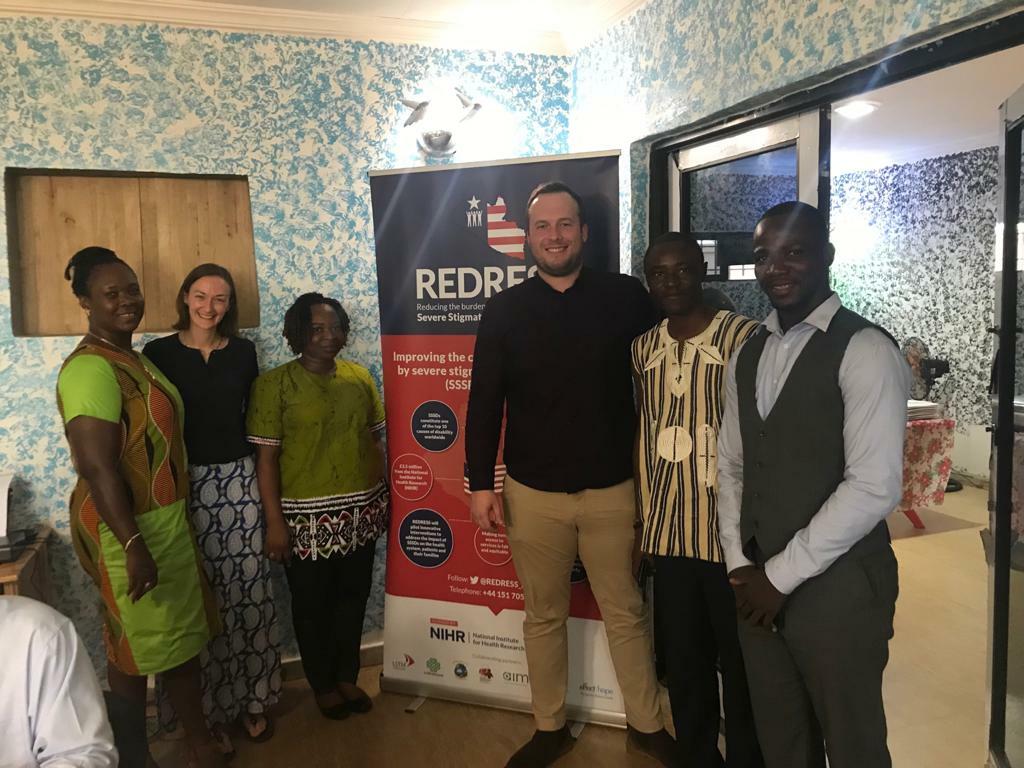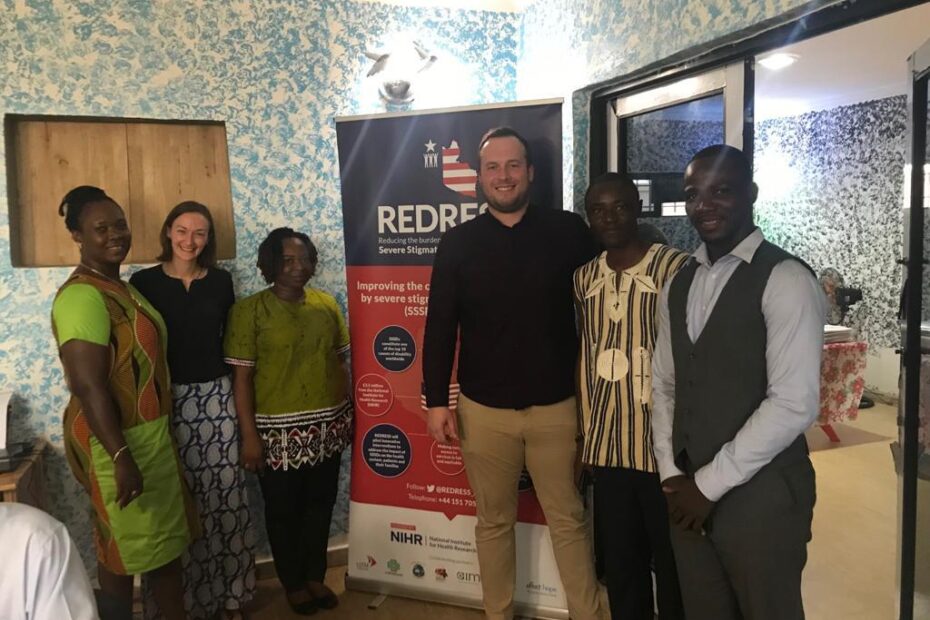
A Reflection from REDRESS Research Fellows
On the 17th of May, the Liverpool School of Tropical Medicine (LSTM) hosted a virtual symposium on Global Health Research Towards Ending Preventable Deaths: Equity, Access, and Delivery(link is external). This was the second symposium in a series of three, developed in partnership with the Department for International Development (DfID) and Gavi, the Vaccine Alliance (GAVI).
Opening remarks from Wendy Morton, Parliamentary Under-Secretary of State for International Development and Dr Antara Sinha, Senior Executive Officer at GAVI highlighted the need for research informed investment in global health; collaborative research approaches; a strong equity focus and the need for an integrated response to recovery following the COVID-19 pandemic. These comments resonated with us as REDRESS research fellows, since the REDRESS research consortium aims to improve the care of people affected by severe stigmatising skin diseases (SSSDs) in Liberia, who are often among the most vulnerable and poor and an equity approach is critical in our work.
In this blog, REDRESS researchers reflect on three key aspects of presentations – mental health, the role of community health workers (CHWs) and the need for multidisciplinary collaboration. Finally, we consider lessons learned from the symposium which may benefit REDRESS.
Experiences working with Mental Health Services during disease outbreak
Dr. Janice Cooper(link is external), Senior Project Advisor for Mental Health with the Carter Centre in Liberia, and also part of our REDRESS project, reflected on her experiences leading the Liberian Mental Health and Psychosocial Pillar as part of Liberia’s response during the West Africa Ebola outbreak. The disease typically led to widespread fear, panic, stigmatisation, and social exclusion of patients, survivors, and their families. Ebola’s psychosocial effects included adjustment disorders, symptoms of anxiety, depression, and delirium, which was common towards the end-stage of the disease. The breakdown of social support systems increased psychological distress associated with the disease in Liberia. Additionally, health workers had to cope with the deaths of colleagues, threats to their lives, and working excessive hours, in addition to their own anxiety and fear of infection.
As part of many response efforts, psychosocial interventions were of great importance. Several strategies introduced included facilitating Community Healing Dialogues (CHD), where community dwellers affected by the outbreak were engaged by psychosocial workers and counselled with the aim of improving psychosocial wellbeing, improving individuals’ capacity to recognise emotions and their effects, and fostering community-level healing. An anti-stigma campaign helped reduce stigmatisation of patients and their relatives within the community. Leadership in this campaign came from the top. Dr Cooper recounted how during an audience with Ebola survivors held at Monrovia City Hall at a time when there was still a high level of stigma surrounding survivors, the Minister of Health ensured that he hugged every audience member, reinforcing the message that survivors were not contagious. Within REDRESS we seek to learn from successful stigma reduction processes, such as community healing dialogues following the Ebola outbreak, to support in the development of stigma reduction and psycho-social support strategies that can be delivered at the community level to support people affected by SSSDs.
The contributions of CHWs during disease outbreak
Dr. Haja Wurie(link is external), Dean of Faculty of Nursing, College of Medicine and Health Sciences, University of Sierra Leone, shared insightful experiences from working with CHWs in Sierra Leone during the Ebola outbreak. She stated that, “communities are not only the frontline of the response, they are the frontline”.
CHWs in Sierra Leone support child and maternal health services by bridging the gap between diverse communities and the health system around the country. Moreover, during the Ebola outbreak, CHWs played a series of vital roles as social mobilizers, contact tracers and members of the burial team. CHWs ensured that services around child and mental health services were maintained during the Ebola outbreak and this continues during the COVID-19 pandemic. One of the many lessons learned from the Ebola outbreak, is that the work done by CHWs to promote trust between their communities and the primary health care providers, led to increased service uptake within the country. Other lessons learned from the community through the Ebola outbreak which can support the COVID19 response, are the establishment of practices like handwashing, and the need for early involvement, engagement and information sharing from people within communities who enjoy trust, such as traditional leaders.
Multidisciplinary Collaboration in international research consortia
Dr Rachel Thomson, director for COUNTDOWN research project with LSTM, spoke about recent research carried out to improve care for patients with female genital schistosomiasis (FGS) through COUNTDOWN which seeks to use health systems strengthening approaches to improve Neglected Tropical Disease (NTD) drug delivery as part of the broader health system. Dr Melita Gordon and team (Malawi-Liverpool Wellcome Trust Program) conducted research on Salmonella Vaccination in Malawi. This research project was co-funded by a multi-national consortium (Wellcome Trust and the Gates Foundation).
Both speakers highlighted the need for strong partnerships and collaborations, to ensure that research carried out meets the research needs of stakeholders planning and coordinating delivery of care. Within COUNTDOWN the importance of working with groups outside the usual NTD programme, such as gynaecologists for FGS and disability organisations for stigma and wellbeing has proved critical. Similarly, ensuring that stakeholders, such as programme staff and implementers are involved in research as co-researchers, and involving the community in the selection of community drug distributors was found to promote trust across levels.
The vaccination trial in Malawi, established a strong partnership with the Ministry of Education to target primary schools for vaccination, due to the age distribution of children (0-12 years) and to ensure no one was left behind, especially within vulnerable and fragile communities. This collaboration brought great enthusiasm to achieve targets across the Education sector, from the Minister for Education through to teachers and parent-teacher associations. Involving a multi-sectoral approach, the Ministry of Education was able to guide researchers to identify classrooms where children sit on rocks and learn, illustrating the way some children or schools can be left behind. As a result of this knowledge, efforts were made to reach out to schools where typhoid was high, or sanitation was poor. This was an opportunity to increase value and to address inequity to make a bigger impact.
Finally, international consortia and co-funding are essential, to ensure lowest income countries do not get left behind.
What lessons are there for REDRESS from the symposium?
Key lessons which we as REDRESS research fellows have learned from the symposium and plan to apply within REDRESS are as follows:
- Prioritising mental health support for communities and health workers is essential, since persons affected by disease – whether Ebola, COVID-19, or a SSSD often suffer because of stigma.
- It is vital to foster trust and maintain transparency between communities and the health system, to build relationships and to seek to reduce stigma and improve community cohesion. CHWs in both Liberia and Sierra Leone can have positive impact in fostering this trust.
- The importance of multidisciplinary approaches for stronger research studies and greater impact beyond the end of the study. REDRESS will focus on improving care for patients with SSSDs by engaging with the areas of Epidemiology, Clinical lab services; Health Financing; Human Resources for Health and patient centred care services in Liberia.
- International consortia and health financing are essential, especially for SSSDs which have been neglected by many stakeholders in the past.
There is no better time to leverage the experiences shared by panellists from this symposium than now, when REDRESS researchers are working to identify best practices and current knowledge gaps. As research fellows, we look forward to applying learning from the experiences shared by the symposium’s presenters when planning and designing REDRESS interventions to better address knowledge gaps and concerns, to improve care for persons affected by SSSDs in Liberia.
